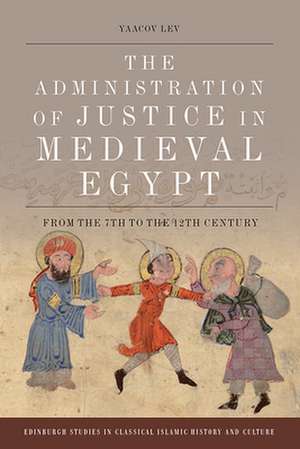The Administration of Justice in Medieval Egypt: Edinburgh Studies in Classical Islamic History and Culture
Autor Yaacov Leven Limba Engleză Paperback – 14 dec 2021
| Toate formatele și edițiile | Preț | Express |
|---|---|---|
| Paperback (1) | 142.29 lei 3-5 săpt. | +24.83 lei 7-13 zile |
| EDINBURGH UNIVERSITY PRESS – 14 dec 2021 | 142.29 lei 3-5 săpt. | +24.83 lei 7-13 zile |
| Hardback (1) | 555.08 lei 3-5 săpt. | |
| EDINBURGH UNIVERSITY PRESS – 18 mar 2020 | 555.08 lei 3-5 săpt. |
Din seria Edinburgh Studies in Classical Islamic History and Culture
- 10%
 Preț: 175.30 lei
Preț: 175.30 lei - 9%
 Preț: 216.06 lei
Preț: 216.06 lei - 10%
 Preț: 187.26 lei
Preț: 187.26 lei - 5%
 Preț: 141.12 lei
Preț: 141.12 lei -
 Preț: 149.02 lei
Preț: 149.02 lei - 18%
 Preț: 618.52 lei
Preț: 618.52 lei - 8%
 Preț: 255.36 lei
Preț: 255.36 lei - 8%
 Preț: 253.51 lei
Preț: 253.51 lei -
 Preț: 310.84 lei
Preț: 310.84 lei - 10%
 Preț: 174.69 lei
Preț: 174.69 lei - 8%
 Preț: 218.36 lei
Preț: 218.36 lei - 18%
 Preț: 1070.74 lei
Preț: 1070.74 lei - 5%
 Preț: 141.93 lei
Preț: 141.93 lei - 11%
 Preț: 172.81 lei
Preț: 172.81 lei - 17%
 Preț: 621.25 lei
Preț: 621.25 lei - 17%
 Preț: 618.91 lei
Preț: 618.91 lei - 18%
 Preț: 618.66 lei
Preț: 618.66 lei - 11%
 Preț: 165.56 lei
Preț: 165.56 lei - 6%
 Preț: 170.19 lei
Preț: 170.19 lei -
 Preț: 133.46 lei
Preț: 133.46 lei - 10%
 Preț: 173.71 lei
Preț: 173.71 lei - 18%
 Preț: 554.85 lei
Preț: 554.85 lei - 18%
 Preț: 555.24 lei
Preț: 555.24 lei - 17%
 Preț: 618.91 lei
Preț: 618.91 lei
Preț: 142.29 lei
Preț vechi: 149.19 lei
-5% Nou
Puncte Express: 213
Preț estimativ în valută:
27.24€ • 28.42$ • 22.83£
27.24€ • 28.42$ • 22.83£
Carte disponibilă
Livrare economică 19 februarie-05 martie
Livrare express 05-11 februarie pentru 34.82 lei
Preluare comenzi: 021 569.72.76
Specificații
ISBN-13: 9781474459242
ISBN-10: 1474459242
Pagini: 312
Dimensiuni: 156 x 234 x 17 mm
Greutate: 0.44 kg
Editura: EDINBURGH UNIVERSITY PRESS
Seria Edinburgh Studies in Classical Islamic History and Culture
ISBN-10: 1474459242
Pagini: 312
Dimensiuni: 156 x 234 x 17 mm
Greutate: 0.44 kg
Editura: EDINBURGH UNIVERSITY PRESS
Seria Edinburgh Studies in Classical Islamic History and Culture
Notă biografică
Yaacov Lev is Professor (Emeritus) in Middle Eastern Studies at Bar Ilan University, Israel. He is author of several books including Saladin in Egypt (Brill, 1998), Charity, Endowments, and Charitable Institutions in Medieval Islam (University Press of Florida, 2006) and Towns and Material Culture in the Medieval Middle East (Brill, 2013). His most recent publications include articles in JSAI and Medieval Encounters, and a chapter in Developing Perspectives in Mamluk History, edited by Yuval Ben-Bassat (Brill, 2017).
